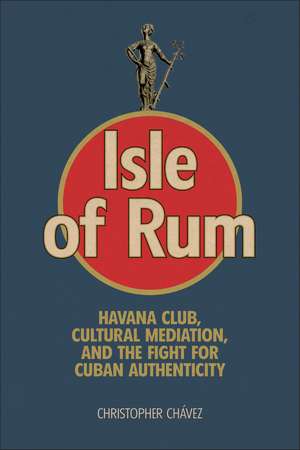Isle of Rum: Havana Club, Cultural Mediation, and the Fight for Cuban Authenticity
Autor Christopher Chávezen Limba Engleză Paperback – 13 sep 2024
Rather than laying claim to authentic Cuban culture, Chávez explores which aspects of Cuban culture are deemed most compelling and, therefore, most profitable by corporate marketers. As a joint venture between the Cuban state and Pernod Ricard, a global spirits marketer based in Paris, Havana Club embodies the larger process of economic reform, which was meant to reintegrate Cuba into global markets during Cuba’s Special Period in a Time of Peace.
Preț: 211.41 lei
Nou
Puncte Express: 317
Preț estimativ în valută:
40.45€ • 43.26$ • 33.73£
40.45€ • 43.26$ • 33.73£
Carte disponibilă
Livrare economică 27 martie-10 aprilie
Preluare comenzi: 021 569.72.76
Specificații
ISBN-13: 9781978838833
ISBN-10: 1978838832
Pagini: 190
Ilustrații: 18 B-W
Dimensiuni: 152 x 229 x 8 mm
Greutate: 0.3 kg
Editura: Rutgers University Press
Colecția Rutgers University Press
ISBN-10: 1978838832
Pagini: 190
Ilustrații: 18 B-W
Dimensiuni: 152 x 229 x 8 mm
Greutate: 0.3 kg
Editura: Rutgers University Press
Colecția Rutgers University Press
Notă biografică
CHRISTOPHER CHÁVEZ is the Caroline S. Chambers Distinguished Professor of Advertising and the director of the Center for Latina/o and Latin American Studies (CLLAS) in the School of Journalism and Communication at the University of Oregon in Eugene. He is the author of The Sound of Exclusion: NPR and the Latinx Public and Reinventing the Latino Television Viewer: Language Ideology and Practice.
Cuprins
List of Illustrations
Introduction
Chapter One: Advertising and Authenticity
Chapter Two: Selling Cuban Culture
Chapter Three: Long-Distance Nationalism and the Logic of Capitalism
Chapter Four: Museums and Memory
Chapter Five: Rum, Race, and Representation
Chapter Six: The Losing Game of Authenticity
Acknowledgments
References
Index
Introduction
Chapter One: Advertising and Authenticity
Chapter Two: Selling Cuban Culture
Chapter Three: Long-Distance Nationalism and the Logic of Capitalism
Chapter Four: Museums and Memory
Chapter Five: Rum, Race, and Representation
Chapter Six: The Losing Game of Authenticity
Acknowledgments
References
Index
Recenzii
"Isle of Rum is an intoxicating journey through the heart and soul of Cuba’s most iconic spirit. Meticulously researched, Chávez’s exploration of the intersections of commercial pressures, the socialist state, and advertising culture provides a thought-provoking narrative of how authenticity is continuously reimagined in the global marketplace. Whether you are a rum aficionado, a communication studies student, or just curious about the sociopolitical complexities of Cuba, this is a must-read. Simply fantastic."
"Through decades of advertising and internal corporate documents, Chávez examines the case study of Havana Club rum. Unlike the ubiquitous Bacardi rum, Havana Club remains a state-run product, produced in communist Cuba. Chávez effectively argues that the ever-changing marketing campaigns reflect the evolving political, economic, and social conditions in Cuba, from campaigns that promote Cuban rum as a kind of cultural diplomacy to one that becomes about the marketing of the commodity itself to Western, capitalist social influencers."
"Through decades of advertising and internal corporate documents, Chávez examines the case study of Havana Club rum. Unlike the ubiquitous Bacardi rum, Havana Club remains a state-run product, produced in communist Cuba. Chávez effectively argues that the ever-changing marketing campaigns reflect the evolving political, economic, and social conditions in Cuba, from campaigns that promote Cuban rum as a kind of cultural diplomacy to one that becomes about the marketing of the commodity itself to Western, capitalist social influencers."
Descriere
Focusing on Havana Club rum as a case study, Isle of Rum examines the ways in which western cultural producers, working in collaboration with the Cuban state, have assumed responsibility for representing Cuba to the outside world. Christopher Chávez focuses specifically on the role of advertising practitioners, musicians, filmmakers, and visual artists, who stand to benefit economically by selling an image of Cuba to consumers who desperately crave authentic experiences that exist outside of the purview of the marketplace.
